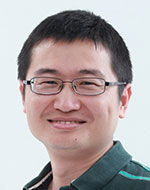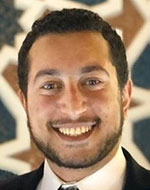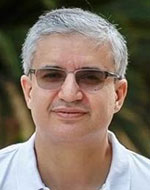Tutorial 1
Task-oriented Communication for Edge AI: From “How to Communicate” to “What to Communicate”
Presenter: Jun Zhang, Associate Professor, The Hong Kong Polytechnic University, Hong Kong
Date/Time: Tuesday Sept 7th, from 9am to 12:15pm Athens time (UTC+3)
Abstract: Deep learning has achieved remarkable successes in many application domains, such as computer vision, image processing, and natural language processing. However, deploying powerful deep learning models on resource-constrained mobile devices (e.g., wearable or IoT devices) faces great challenges. Recently, edge AI techniques that rely on the emerging mobile edge computing (MEC) platforms have been proposed, which forwards intermediate features to be processed by a powerful edge server. To achieve high-accuracy and low-latency inference, effective feature encoders with low complexity and high compression capability will be needed. This calls for a paradigm shift in wireless communications, from “data-oriented communications”, which maximize data rates, to “task-oriented communications”, where the data transmission is an intermediate step and it should be optimized for the downstream task rather for reconstructing the source data. This tutorial will present principled design approaches and introduce recent progresses on task-oriented communication for edge AI. In particular, a brand-new communication-computation tradeoff will be introduced. An effective design principle based on information bottleneck will be then presented. To reduce on-device computation, effective methods for neural network architecture design will also be discussed.
 Biography: Jun Zhang received his Ph.D. degree in Electrical and Computer Engineering from the University of Texas at Austin. He is an Associate Professor in the Department of Electronic and Information Engineering at the Hong Kong Polytechnic University. His research interests include wireless communications and networking, mobile edge computing and edge learning, distributed learning and optimization, and big data analytics. Dr. Zhang co-authored the book Fundamentals of LTE (Prentice-Hall, 2010). He is a co-recipient of several best paper awards, including the 2021 Best Survey Paper Award of the IEEE Communications Society, the 2019 IEEE Communications Society & Information Theory Society Joint Paper Award, and the 2016 Marconi Prize Paper Award in Wireless Communications. Two papers he co-authored received the Young Author Best Paper Award of the IEEE Signal Processing Society in 2016 and 2018, respectively. He also received the 2016 IEEE ComSoc Asia-Pacific Best Young Researcher Award. He is an Editor of IEEE Transactions on Communications, and was an editor of IEEE Transactions on Wireless Communications (2015-2020). He served as a MAC track co-chair for IEEE Wireless Communications and Networking Conference (WCNC) 2011 and a wireless communications symposium co-chair of IEEE International Conference on Communications (ICC) 2021.
Biography: Jun Zhang received his Ph.D. degree in Electrical and Computer Engineering from the University of Texas at Austin. He is an Associate Professor in the Department of Electronic and Information Engineering at the Hong Kong Polytechnic University. His research interests include wireless communications and networking, mobile edge computing and edge learning, distributed learning and optimization, and big data analytics. Dr. Zhang co-authored the book Fundamentals of LTE (Prentice-Hall, 2010). He is a co-recipient of several best paper awards, including the 2021 Best Survey Paper Award of the IEEE Communications Society, the 2019 IEEE Communications Society & Information Theory Society Joint Paper Award, and the 2016 Marconi Prize Paper Award in Wireless Communications. Two papers he co-authored received the Young Author Best Paper Award of the IEEE Signal Processing Society in 2016 and 2018, respectively. He also received the 2016 IEEE ComSoc Asia-Pacific Best Young Researcher Award. He is an Editor of IEEE Transactions on Communications, and was an editor of IEEE Transactions on Wireless Communications (2015-2020). He served as a MAC track co-chair for IEEE Wireless Communications and Networking Conference (WCNC) 2011 and a wireless communications symposium co-chair of IEEE International Conference on Communications (ICC) 2021.
Tutorial 2
Towards Global Connectivity Using Aerial ad Space Networks
Presenters: Mohamed-Slim Alouini and Mustafa Kishk
Date/Time: Tuesday Sept 7th, from 2pm to 5:15pm Athens time (UTC+3)
Abstract: The United Nations (UN) has defined a set of sustainable development goals (SDGs) targeted for 2030 that include ending poverty, hunger, and inequalities, establishing high quality of education and medical services, to name a few. Achieving such goals requires advancement in many industries, which includes the internet and communication technology (ICT) sector. In particular, establishing high quality internet service provides opportunities to stimulate economy in poor communities, access to remote learning, access to digital records and remote patient monitoring, and help farmers improve productivity. In this context, and as the standardization of the fifth generation (5G) of wireless communication systems (WCSs) has been completed, and 5G networks are in their early stage of deployment, the research visioning and planning of the sixth generation (6G) of WCSs are being initiated. However, it is well-known that urbanized regions have been the major beneficiaries of the advances in the previous generations of WCSs. Hence, it is important to carry research with the focus on ensuring digital inclusion of rural and remote areas, which currently lack stable access to internet connectivity. In this talk, we focus on (i) possible network architectures to establish backhaul connectivity in rural and remote areas, with emphasis on satellite-based solutions, (ii) current challenges facing internet access in rural areas, (iii) possible solutions to enhance internet access in rural areas, with emphasis on drone-based architectures, and (iv) existing solutions to improve the flight duration of drones and ensure stable coverage in rural areas.
 Biography: Mustafa A. Kishk received the B.Sc. and M.Sc. degrees from Cairo University, Giza, Egypt, in 2013 and 2015, respectively, and the Ph.D. degree from Virginia Tech, Blacksburg, VA, USA, in 2018. He is a Postdoctoral Research Fellow with the Communication Theory Laboratory, King Abdullah University of Science and Technology, Thuwal, Saudi Arabia. His current research interests include stochastic geometry, energy harvesting wireless networks, UAV-enabled communication systems, and satellite communications.
Biography: Mustafa A. Kishk received the B.Sc. and M.Sc. degrees from Cairo University, Giza, Egypt, in 2013 and 2015, respectively, and the Ph.D. degree from Virginia Tech, Blacksburg, VA, USA, in 2018. He is a Postdoctoral Research Fellow with the Communication Theory Laboratory, King Abdullah University of Science and Technology, Thuwal, Saudi Arabia. His current research interests include stochastic geometry, energy harvesting wireless networks, UAV-enabled communication systems, and satellite communications.
 Biography: Mohamed-Slim Alouini was born in Tunis, Tunisia. He received the Ph.D. degree in Electrical Engineering from the California Institute of Technology (Caltech) in 1998. He served as a faculty member at the University of Minnesota then in the Texas A&M University at Qatar before joining in 2009 the King Abdullah University of Science and Technology (KAUST) where he is now a Distinguished Professor of Electrical and Computer Engineering. Prof. Alouini is a Fellow of the IEEE and of the OSA. He is currently particularly interested in addressing the technical challenges associated with the uneven distribution, access to, and use of information and communication technologies in far-flung, rural, low-density populations, low-income, and/or hard-to-reach areas.
Biography: Mohamed-Slim Alouini was born in Tunis, Tunisia. He received the Ph.D. degree in Electrical Engineering from the California Institute of Technology (Caltech) in 1998. He served as a faculty member at the University of Minnesota then in the Texas A&M University at Qatar before joining in 2009 the King Abdullah University of Science and Technology (KAUST) where he is now a Distinguished Professor of Electrical and Computer Engineering. Prof. Alouini is a Fellow of the IEEE and of the OSA. He is currently particularly interested in addressing the technical challenges associated with the uneven distribution, access to, and use of information and communication technologies in far-flung, rural, low-density populations, low-income, and/or hard-to-reach areas.
Tutorial 3
Safe Drone Operations supported by cellular networks
Presenter(s): Evgenii Vinogradov and Sofie Pollin
Date/Time: Friday Sept 10th, from 9 AM to 12:15 PM Athens time (UTC+3)
Abstract: Small drones are becoming a part of our everyday life. They are used in a wide variety of commercial applications, and the number of drones in the air is steadily growing. The tutorial consists of two main parts dedicated to i) a general introduction to the wireless support of UAVs conflict management and ii) theoretical and experimental analysis of the current cellular networks readiness for ensuring safe UAV use. We start this tutorial with a brief introduction describing the most promising drone-enabled use cases. To guarantee the safe operation of drones, traffic management rules must be designed and implemented by avionics and telecommunication experts. In this tutorial, we describe the common terminology for these two communities. The first part is concluded by formulating the main requirements imposed by safe drone operations on cellular networks. The second part presents realistic simulations and extensive measurement campaigns to assess the potential of 4G and 5G networks for drones communications. We also depict the challenges that must be addressed to guarantee drones safe operations.
 Biography: Evgenii Vinogradov received the Dipl. Engineer degree in Radio Engineering and Telecommunications from Saint-Petersburg Electro-technical University (Russia), in 2009. After several years of working in the field of mobile communications, he joined UCLouvain (Belgium) in 2013, where he obtained his Ph.D. degree in 2017. His doctoral research interests focused on multidimensional radio propagation channel modeling. In 2017, Evgenii joined the electrical engineering department at KU Leuven (Belgium) where he is working on wireless communications with UAVs and UAV detection. He has also authored several tutorials (during VTC’21, GLOBECOM’20, ICC’19, EuCAP’19, and others) dedicated to various aspects of wireless communications with drones. Moreover, he actively participated in SESAR (Single European Sky ATM Research) project PercEvite. This resulted in a clear understanding of the regulators’ needs and goals.
Biography: Evgenii Vinogradov received the Dipl. Engineer degree in Radio Engineering and Telecommunications from Saint-Petersburg Electro-technical University (Russia), in 2009. After several years of working in the field of mobile communications, he joined UCLouvain (Belgium) in 2013, where he obtained his Ph.D. degree in 2017. His doctoral research interests focused on multidimensional radio propagation channel modeling. In 2017, Evgenii joined the electrical engineering department at KU Leuven (Belgium) where he is working on wireless communications with UAVs and UAV detection. He has also authored several tutorials (during VTC’21, GLOBECOM’20, ICC’19, EuCAP’19, and others) dedicated to various aspects of wireless communications with drones. Moreover, he actively participated in SESAR (Single European Sky ATM Research) project PercEvite. This resulted in a clear understanding of the regulators’ needs and goals.
 Biography: Sofie Pollin is professor at KU Leuven focusing on wireless communication systems. Before that, she worked at imec and UC Berkeley. Her research centers around wireless networks that require networks that are ever more dense, heterogeneous, battery powered and spectrum constrained. She pioneered a 5G testbed for distributed Massive MIMO at KU Leuven, and is now leading the way towards 6G tests in multiple large EU projects. She has been working on UAV communication since 2013 and is in this context officer of the IEEE Comsoc Aerial Communications ETI and specialty chief editor of the frontiers section on aerial and space networks.
Biography: Sofie Pollin is professor at KU Leuven focusing on wireless communication systems. Before that, she worked at imec and UC Berkeley. Her research centers around wireless networks that require networks that are ever more dense, heterogeneous, battery powered and spectrum constrained. She pioneered a 5G testbed for distributed Massive MIMO at KU Leuven, and is now leading the way towards 6G tests in multiple large EU projects. She has been working on UAV communication since 2013 and is in this context officer of the IEEE Comsoc Aerial Communications ETI and specialty chief editor of the frontiers section on aerial and space networks.


